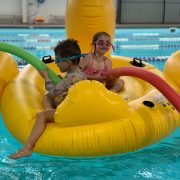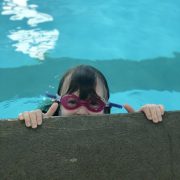Let’s talk about water safety!
According to the Royal Lifesaving drowning report for 2018 Drowning is still the leading cause of accidental death in children under 5 within Australia. These statistics are scary and something that 5 Star Swim Schools is passionate about changing. We make sure to always incorporate safety into each of our lessons and also hold regular SwimSafer weeks at all of our centre. Further to this we believe that the best way to learn how to be safe in and around water is to learn how to be a strong and confident swimmer. Here is a list that we have put together with some tips to help make sure your children are safer around water.
Learn to swim
The number one gift you can give your child is to learn how to swim. In order to make sure that your children are competent around water they must attend regular swimming lessons. It is a common misconception that a child is a strong swimmer when they can swim 25m freestyle. To be safe around water means having the ability to get out of dangerous situations on their own. We wouldn’t class a swimmer as “strong “until they can comfortably swim 400m consecutively.
Open waters such as the ocean, lakes, rivers and dams are very different to the pool. Not only is supervision more difficult, but so are the swimming conditions. No one should swim on their own without being able to swim at least 400m comfortably in the pool.
Supervise
If you want to ensure that your children are safer around water, then put your phone down and watch them. Supervising your children while they are swimming should be your only priority. Put away any distractions and always keep children within arms’ reach. Floaties are not lifeguards and do not mean that your children are safe. Drowning can be silent and happens very quickly. The only way to prevent accidents from happening is to make sure that you are present.
Fence the pool and shut the gate
In the words of Laurie Lawrence and his kids’ alive campaign “Fence the pool, shut the gate!” Make sure to regularly check your pool fence and gate. Never leave the gate propped open making it easy for children to access the pool unsupervised. You should also check that there is nothing inside or outside of the pool area that children can use to help them climb over the fence.
Do not leave any water laying around
Children can drown in as little as 2 inches of water. Check your house and yard to make sure that you have no tubs, buckets, containers or large water bowls laying around full of water. Make sure that any time you use the bath or a paddle pool it gets emptied straight away after use. Water sensory play can be a great way to talk to your children about being safe around water. Always teach them to ask for permission before they go near water.
Teach your children not to enter the water without permission first
Your children should be taught to respect the water. Having conversations at home and at swimming lessons with your kids to help teach them about being safe around water could be a life saver. This doesn’t need to be a scary topic. Teach children to always ask a responsible adult for permission and to supervise them while they are swimming. A good rule is to never go swimming alone. Speak with your children about what they should do if they ever found themselves in a tricky situation while swimming. Spend time with your children playing in the water. This will help to build confidence. Enrol your children in weekly swimming lessons. 5 Star Swim Schools aquatic educators will teach your children about being water safe and help them to build the skills that it will take to be a strong, confident swimmer.
Learn CPR
CPR saves lives. Get qualified and keep those qualifications up to date. CPR certificates are only valid for 12 months it is important to keep getting qualified every 12 months.
In the time it takes…
• To cross the room and grab a towel, a child could be submerged.
• Answer the phone, a child could lose consciousness.
• Sign for a package at the front door, a child could submerge in a tub or pool and sustain brain damage or drown.
Death is not the only risk associated with drowning. Non-fatal drowning can cause lifelong affects. On average 996 Australians are involved in drowning related incidents every year. 36% of all drownings causing death in Australia throughout 2018 were children aged 0-4 years, 25% were children aged 5-14 years. Please help us to lower these statistics. Swimming lessons should be a priority in every household. Living on the NSW central coast we are surrounded by beautiful large bodies of water. Let’s enjoy coastal living and help to eliminate drowning in Australia.


